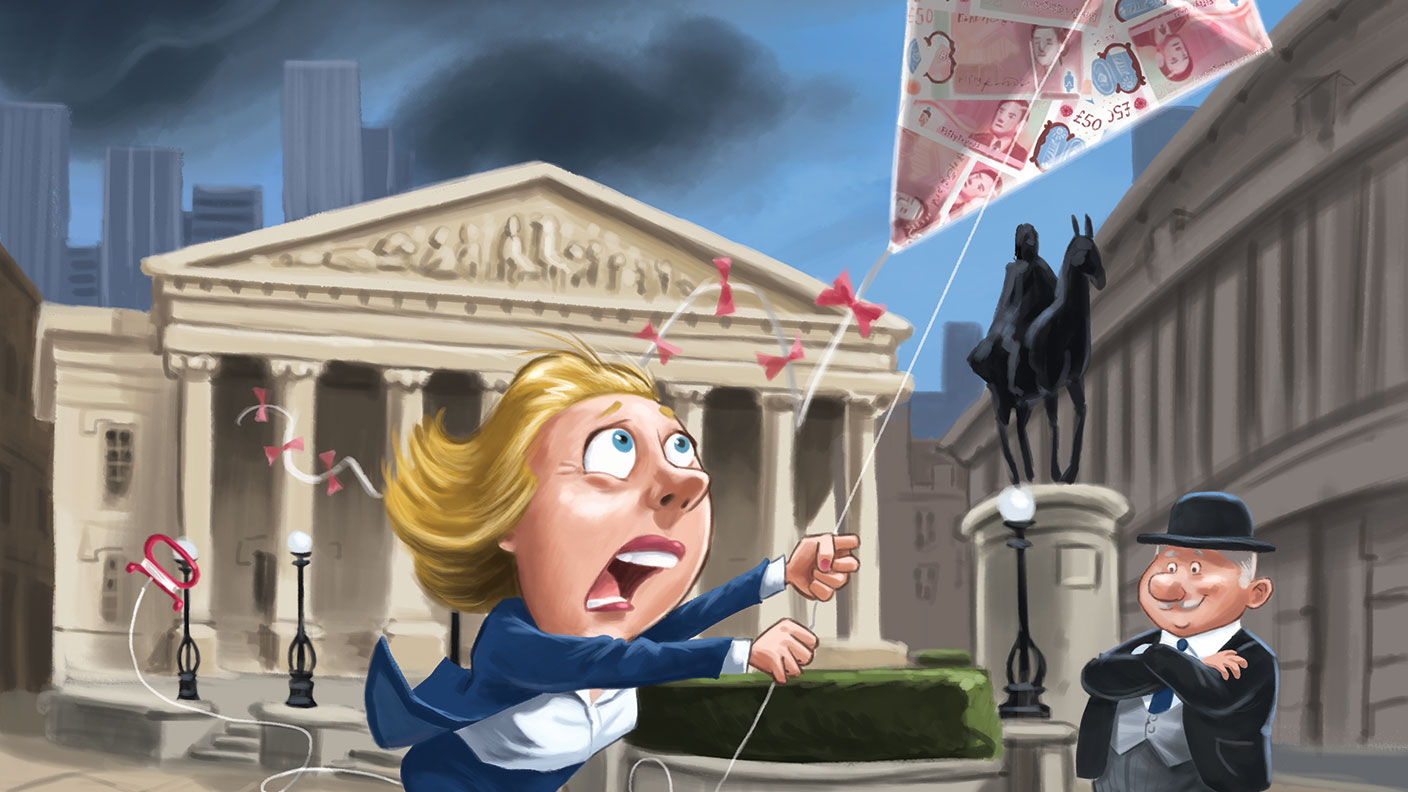Three reasons to worry about Greece – and what to do to protect your wealth
With the Greek crisis gripping Europe, it's time to take action to protect your portfolio. John Stepek explains how.

Get the latest financial news, insights and expert analysis from our award-winning MoneyWeek team, to help you understand what really matters when it comes to your finances.
You are now subscribed
Your newsletter sign-up was successful
Want to add more newsletters?

Twice daily
MoneyWeek
Get the latest financial news, insights and expert analysis from our award-winning MoneyWeek team, to help you understand what really matters when it comes to your finances.

Four times a week
Look After My Bills
Sign up to our free money-saving newsletter, filled with the latest news and expert advice to help you find the best tips and deals for managing your bills. Start saving today!

It's been a busy week for Greece.It's become the first developed nation ever to default on the International Monetary Fund, it's arranging a complicated referendum for Sunday, and it's flip-flopping over whether or not to do a deal with creditors before then. As Merryn notes, the blame for this mess ultimately lies with the hubris of the European project's architects, but there's little to do about that right now. The best outcome for Greece is one that enables it to return to growth and some sort of future.
That could happen outside the eurozone, or it could happen within the eurozone, as long as Greece's debt is restructured sensibly. But as of now, we're far from either of those happy endings. Here are three reasons why, for investors, Greece matters.
1. The domino effect
German Vice Chancellor Sigmar Gabriel argued on Wednesday that Europe had to "stick to the rules" and face down the Syriza government's bargaining efforts, to avoid helping populist parties elsewhere in Europe. "If you allow via blackmail one party to put forward national interests above the will of all others the likes of [Marine] Le Pen win." He's right to be worried.
MoneyWeek
Subscribe to MoneyWeek today and get your first six magazine issues absolutely FREE

Sign up to Money Morning
Don't miss the latest investment and personal finances news, market analysis, plus money-saving tips with our free twice-daily newsletter
Don't miss the latest investment and personal finances news, market analysis, plus money-saving tips with our free twice-daily newsletter
Le Pen, head of France's National Front, has at least a chance of being France's next president, and has actively argued for a 'Frexit' and the demise of the euro. But Gabriel's solution kicking the most junior member of the eurozone when it's down is hardly likely to put offanti-euro protest voters in other nations.
The demise of the eurozone would not necessarily be a bad thing in the long run. Perhaps one day we will see Winston Churchill's "United States of Europe", but such a project needs to be driven from the ground up by the people, not foisted on them by ambitious politicians looking to their legacies. But in the short to medium term, it would be a catastrophe for markets. Look at the chaos Greece has caused. Now imagine France leaving, or Italy, whose bond market is among the largest in the world. That could make 2008 look like a minor crisis.
2. Trust and eurozone banks
The Greek crisis may bring something home to other European citizens how much sense does it make to hold money in a eurozone bank? Think about it. As a British saver, as long as you hold less in your bank account than the £85,000 guaranteed by the Financial Services Compensation Scheme, you can feel pretty safe. Even if there's a crisis, you would expect the authorities to be on your side the Bank of England, however independent it is on paper, won't pull the plug on a bank and plunge you into penury if the government tells it not to.
That's not the case in Europe. The European Central Bank has the power of life or death over the Greek banking system, but it's not answerable to the Greek government. Indeed, it has quietly used its Sword of Damocles as leverage on the behalf of Greece's creditors.
That might not rattle German savers, but as a Portuguese or Italian saver, I'd be looking at a "plan B" for my savings, lest they ever be at the mercy of an unsympathetic central bank.That can only be bad news for faith in the European banking system. As the FT's Lex column notes, the crisis shows "how hard it is to run a banking union and a currency union without a fiscal union. Where the authorities responsible for the first two parts are not the same as the authorities responsible for the third, conflict is always possible. And the institutions at the centre of the conflict will be the banks."
3. The geopolitics
It's worth remembering that all of this is going on at a time when Russia is extremely concerned about its "sphere of influence". That's at least one reason why US President Barack Obama and his colleagues have been on the phone from America, urging a deal to keep Greece in the eurozone. As Marcus Ashworth put it at our Roundtable, "we can't isolate Greece into its own little bucket. That's the problem with Europe they constantly think it's their own little problem, and that no one else can deal with it. But we know what the US thinks, and we know what Russia's trying to do."
Why might Greece matter to Russia? Because, as Robert Kaplan writes in The Wall Street Journal, "Greece is the only part of the Balkans accessible on several seaboards to the Mediterranean, and thus is a crucial gateway to and from the West".
Of course, Russia hasn't given Greece any funding yet, despite overtures from Greek prime minister Alexis Tsipras. But why would Russia give Greece the money it needs now? That would allow it to remain in the eurozone, and be entirely self-defeating. Better to wait and swoop in as the saviour of an abandoned people. "The influence of Moscow can grow quickly in a devastated country as Greece will be after a Grexit," as one fund manager tells Forbes.
What this means for your money
Whatever happens with the referendum, this could still take some time to pan out. So as far as your investments go, our position hasn't changed from last week. Stick with your allocation to stocks (including European ones), but make sure to have more cash available than you normally would (as dry powder to take advantage of falling markets), and also have some gold in your portfolio (as insurance against financial upheaval).
Get the latest financial news, insights and expert analysis from our award-winning MoneyWeek team, to help you understand what really matters when it comes to your finances.

-
 Should you buy an active ETF?
Should you buy an active ETF?ETFs are often mischaracterised as passive products, but they can be a convenient way to add active management to your portfolio
-
 Power up your pension before 5 April – easy ways to save before the tax year end
Power up your pension before 5 April – easy ways to save before the tax year endWith the end of the tax year looming, pension savers currently have a window to review and maximise what’s going into their retirement funds – we look at how
-
 Governments will sink in a world drowning in debt
Governments will sink in a world drowning in debtCover Story Rising interest rates and soaring inflation will leave many governments with unsustainable debts. Get set for a wave of sovereign defaults, says Jonathan Compton.
-
 Why Australia’s luck is set to run out
Why Australia’s luck is set to run outCover Story A low-quality election campaign in Australia has produced a government with no clear strategy. That’s bad news in an increasingly difficult geopolitical environment, says Philip Pilkington
-
 Why new technology is the future of the construction industry
Why new technology is the future of the construction industryCover Story The construction industry faces many challenges. New technologies from augmented reality and digitisation to exoskeletons and robotics can help solve them. Matthew Partridge reports.
-
 UBI which was once unthinkable is being rolled out around the world. What's going on?
UBI which was once unthinkable is being rolled out around the world. What's going on?Cover Story Universal basic income, the idea that everyone should be paid a liveable income by the state, no strings attached, was once for the birds. Now it seems it’s on the brink of being rolled out, says Stuart Watkins.
-
 Inflation is here to stay: it’s time to protect your portfolio
Inflation is here to stay: it’s time to protect your portfolioCover Story Unlike in 2008, widespread money printing and government spending are pushing up prices. Central banks can’t raise interest rates because the world can’t afford it, says John Stepek. Here’s what happens next
-
 Will Biden’s stimulus package fuel global inflation – and how can you protect your wealth?
Will Biden’s stimulus package fuel global inflation – and how can you protect your wealth?Cover Story Joe Biden’s latest stimulus package threatens to fuel inflation around the globe. What should investors do?
-
 What the race for the White House means for your money
What the race for the White House means for your moneyCover Story American voters are about to decide whether Donald Trump or Joe Biden will take the oath of office on 20 January. Matthew Partridge explains how various election scenarios could affect your portfolio.
-
 What’s worse: monopoly power or government intervention?
What’s worse: monopoly power or government intervention?Cover Story Politicians of all stripes increasingly agree with Karl Marx on one point – that monopolies are an inevitable consequence of free-market capitalism, and must be broken up. Are they right? Stuart Watkins isn’t so sure.